Applications of Mathematical Logic in Philosophy and Linguistics
November 10th to 13th, 2000
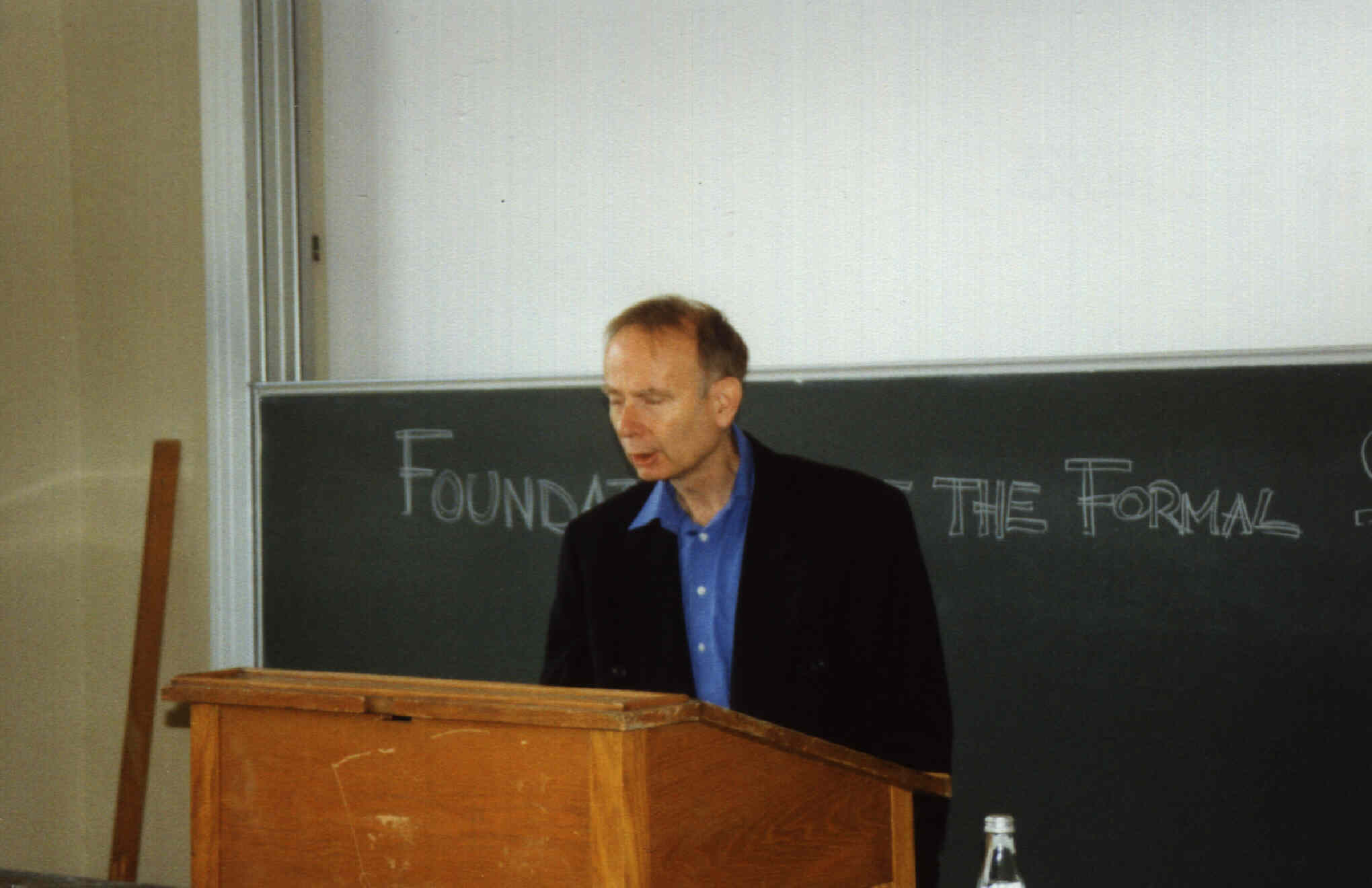
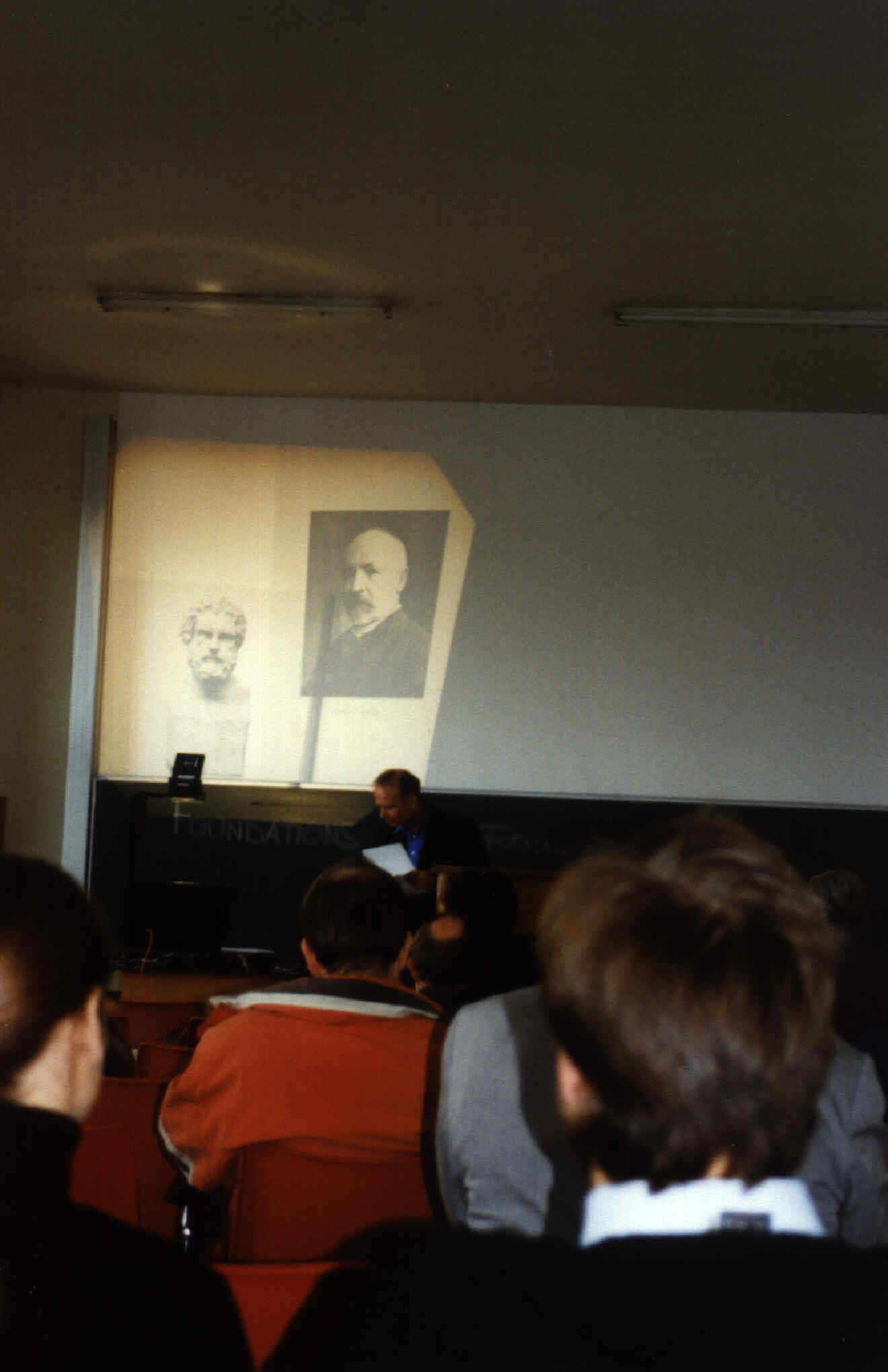
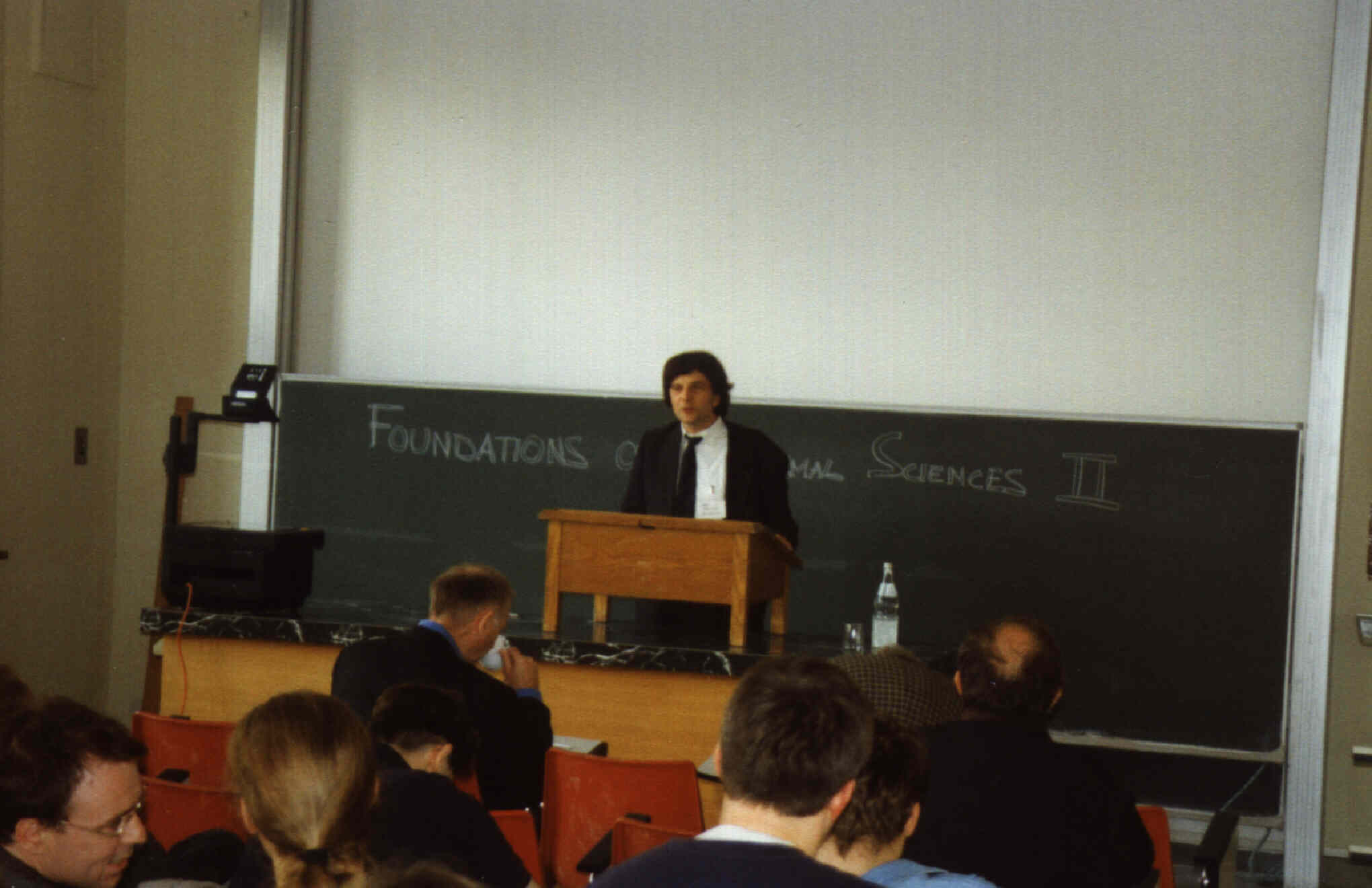
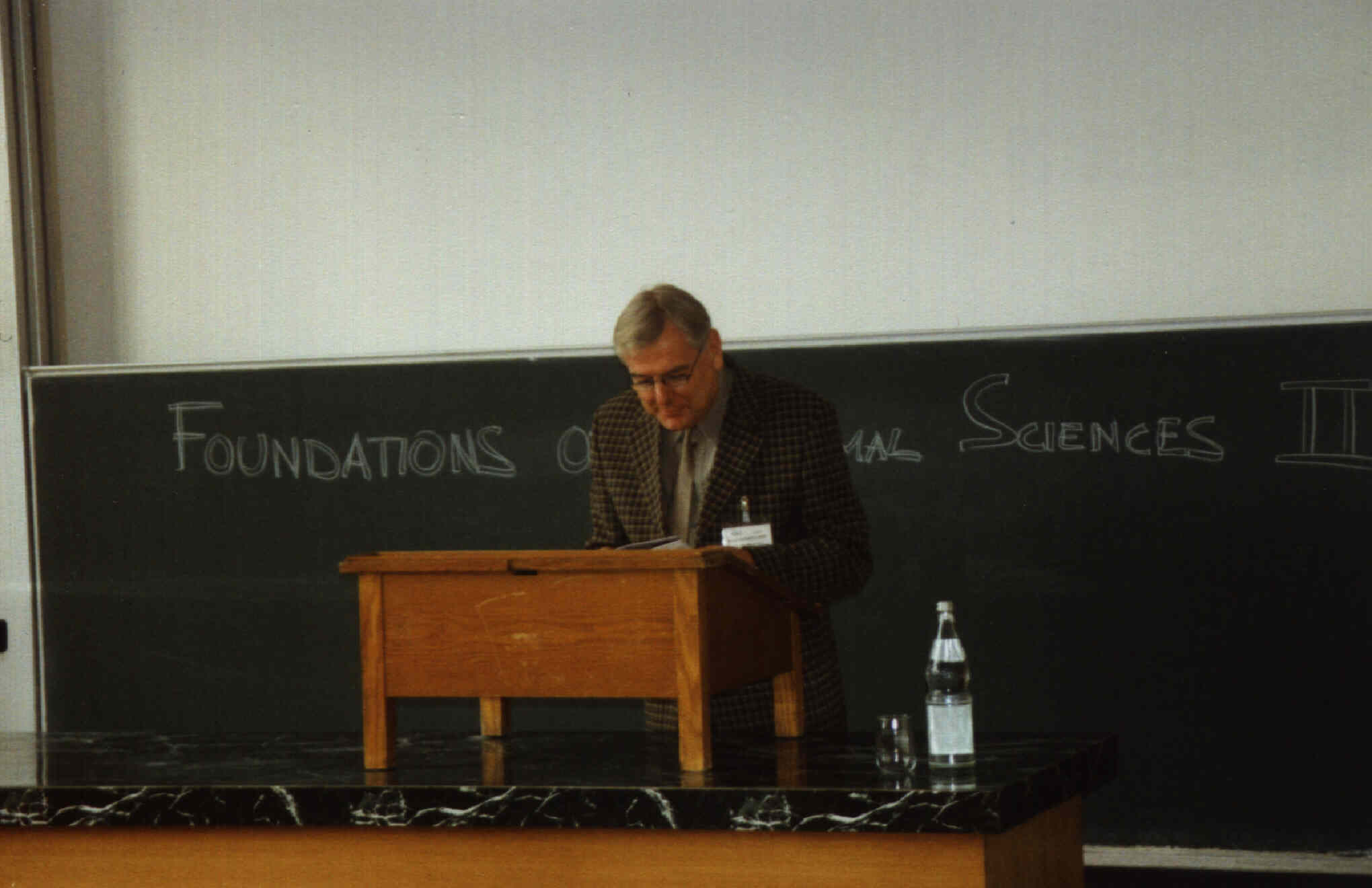
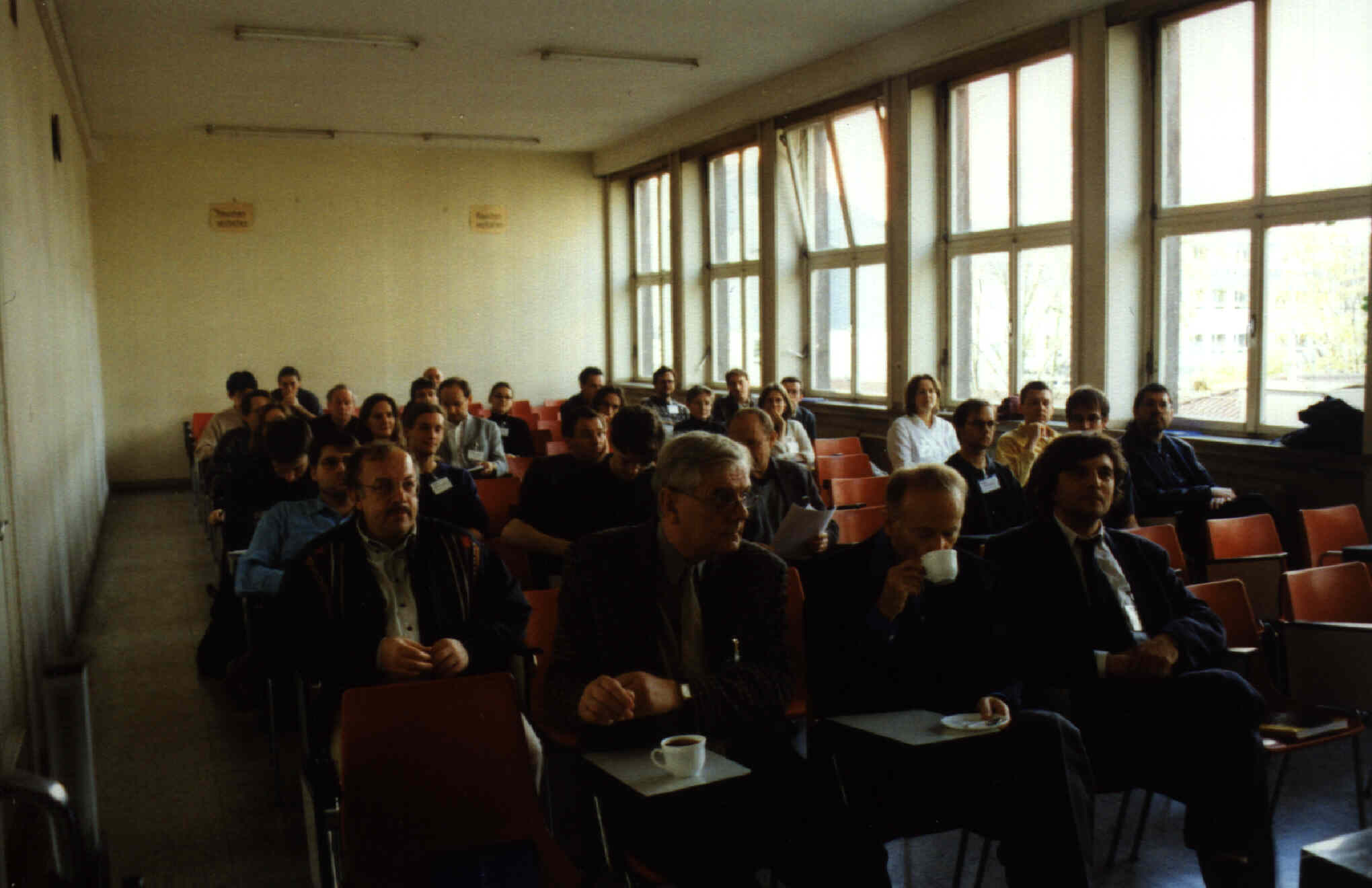
On behalf of the Organizing and Scientific Committee let me welcome you warmly to the second conference on
We are most pleased with the enthusiastic response to our invitation and are looking forward to an excellent meeting which will hold new insights and foster collaborations between various branches of the formal sciences. This conference emphasizes in particular the Applications of Mathematical Logic in Philosophy and Linguistics.
In my opening remarks I hold that formalism is not just applicable in other pure sciences but that a considerable body of applied formalism in its own right has evolved. The close link between pure and applied formalism should be taken into account in research and teaching.
Modern mathematical logic, analytic philosophy and linguistics all look upon Gottlob Frege as a founding father. Frege embodied the close link between these sciences - a link that our conference aims to reestablish. Frege's work is characterized by ingeneous insights and farreaching visions about the scope and applicability of his methods. In his first book "Begriffsschrift, Eine der arithmetischen nachgebildete Formelsprache des reinen Denkens", Frege proposes the first system of what we now call first-order predicate logic. Frege's vision for this method is indicated in the foreword of the book:
"Ich verspreche mir überall da eine erfolgreiche Anwendung meiner Begriffsschrift, wo ein besonderer Werth auf die Bündigkeit der Beweisführung gelegt werden muss, wie bei der Grundlegung der Differential- und Integralrechnung". This has been vindicated convincingly in the axiomatic foundations of set theory after the foundational crisis at the beginning of the 20th century; the widely accepted axiomatics by Zermelo and Fraenkel is now formulated and developed in first order logic. The universality of the first-order deduction rules has been proved by Gödel's completeness theorem. The grand question "What is mathematics" can be answered formally by: "the Zermelo-Fraenkel axioms together with first-order logic".
"Wenn es eine Aufgabe der Philosophie ist, die Herrschaft des Wortes über den menschlichen Geist zu brechen, indem sie die Täuschungen aufdeckt, die durch den Sprachgebrauch über die Beziehungen der Begriffe fast unvermeidlich entstehen, indem sie den Gedanken von demjenigen begreift, womit ihn allein die Beschaffenheit des sprachlichen Ausdrucksmittels behaftet, so wird meine Begriffsschrift, für diese Zwecke weiter ausgebildet, den Philosophen ein brauchbares Werkzeug werden können." Accordingly, philosophy has to analyse language. Gödel's incompleteness theorems, proved for first-order languages, have sharpened the understanding for the limitations of natural languages and have had profound philosophical implications.
Frege's analysis of natural language versus formal languages has isolated fundamental notions and can be seen as the origin of theoretical linguistics.
Frege's Begriffsschrift is a complicated and technically cumbersome device for theoretical arguments about pure thought. Carrying out formal proofs with pen and paper is virtually impossible and a priori holds the status of a thought experiment. But theoretical and technological developments have now transformed formalism into a feasable method.
Gödel's completeness theorem pointed to the possibility that intelligent processes could be mechanized, by atomizing them into a great number of minute, trivial steps. This lead to the concept of computability by recursive algorithms and their practical realization by electronic computers. The elementary steps of computations and formal deductions can be implemented in physical devices and carried out with ever increasing speeds. Checking a formal deduction or even finding simple deductions can be done within seconds.
Given the technological advances, algorithms are becoming more important than the physical device realizing them. I view the computer on my desk as a formal system rather than an electronic machine. Its formal powers are of much greater importance than its arithmetical abilities, indeed the latter can just be subsumed under the formal aspect.
Formal systems in this sense can now be found everywhere. They have to be designed and understood by formal methods: Programming languages are formal languages which try to incorporate some aspects of natural languages. The meaning and the correctness of programs can be explained by methods from model theory, correctness can be proved using formal proofs.
Formal sciences and applied sciences are often linked in the careers of young people who may have studied analytical and formal philosophy and go on to work in the software industry. These connections have to be reflected in the academic practice. Fields like computer science and linguistic have an active interplay between their pure and applied parts. Corresponding possibilities have to be explored in formal philosophy and mathematical logic.
In a constantly changing academic landscape one should consider the possibility of "formal studies": after two year of traditional studies in a philosophical, mathematical or natural science courses should concentrate on pure and applied courses from the formal sciences. Students should learn philosophical and formal logic as well as modern computing methods, including implementation and optimization. They should be enabled to understand and appreciate the varied aspects of formalism as represented on this conference. I propose to hold a round table discussion about such courses of studies at the next FotFS conference at Vienna.
The FotFS conferences aim to encourage interdisciplinary exchange and research in the formal sciences. Our participants are mostly young doctoral or post-doctoral students from a dozen countries on three continents. The brochure of abstracts lists promising themes and indicates possible avenues for further joint projects. There will be a proceedings volume of this conference.
There was a memorable first conference in this series in Berlin last
year, organized by Benedikt Löwe and Florian Rudolph. This
year's conference has been principally organized by Benedikt Löwe and
Thoralf Räsch, with the help of Wolfgang Malzkorn. Generous financial
support of the Deutsche Forschungsgemeinschaft (DFG) has allowed to
invite prominent speakers. I want to extend my sincerest thanks to our
organizers and to a considerable number of local helpers behind the
scenes. Let me finally wish every participant a very successful and
pleasant stay at the University of Bonn.
I don't want to say too much about the contents of the conference, but we are very happy about the way this conference turned out, and we feel comfortable to claim that the conference was a success. The sections showed exactly the interdisciplinary aspects that we wanted to emphasize at this conference, and we feel that this conference (as was the first conference FotFS I in Berlin) was a small step towards reuniting the Formal Sciences.
Instead of going into details and explaining why we feel that way, let me just on behalf of the Organizing & Scientific Committee thank all the speakers, both the Invited Speakers and the speakers of contributed talks, without whom this conference wouldn't have been possible.
While I am thanking people, I can complete the list that Peter Koepke started in his introductory remarks:
We thank all helpers at this conference which made the conference so enjoyable for their support in the hectic organization phase of two weeks before the conference and for volunteering for desk duties, coffee making and other duties.
I'd like to name these people in alphabetic order and hope that I don't forget anyone:
After talking about the past and the conference that lies behind us, let me say two things about the future:
The Proceedings Volume of the conference "Foundations of the Formal Sciences I" will appear as a special double issue of the journal Synthese, and the Managing Editor of Synthese, Jaakko Hintikka has already extended an invitation to submit the proceedings volume for the successor conference FotFS II to Synthese again. The page numbers they offer us do not seem to allow us to publish the optimal version of the Proceedings volume, though.
On the other hand, we expect the proceedings volume to be very interesting for publishers. In fact, it will probably be more interesting than the average Proceedings volume because of its interdisciplinary and introductive character. It should be useable for graduate seminars, ambitious undergraduate seminars and young researchers preparing for interdisciplinary work.
When I say that our volume will be particularly interesting, I wish to imply two things:
First of all, this is to be understood as an exhortation to the authors: Please write your papers with these words as a background - the papers are meant for an interdisciplinary audience, they should not be pure research articles, nor should they be mere surveys. Imagine your own graduate seminars, your own Master's and PhD students and what they'd like to read and give talks on.
In a second layer this means that we are very optimistic that we will get a decent offer for publishing our proceedings volume. So we do not worry about the current legal state of the volume, but proceed to the technical particulars:
We expect 20 to 25 pages from the Invited Speakers and 3 to 5 pages of Extended Abstracts from all other speakers. The deadline is April 1st, 2001. And please send the papers as LaTeX or plain text files to fotfs@math.uni-bonn.de
We shall keep all speakers informed about the progress by e-mail and the webpage will always continue the most current information.
In another look to the future, I'd like to come back to something that has been mentioned several times:
This conference is part of a series of conferences that started with FotFS I in Berlin in May 1999 and will continue with FotFS III in Vienna in September 2001. You will find a first approximation of the poster for FotFS III at the last page of your program booklet. The subtitle of FotFS III is "Complexity in Mathematics and Computer Science", and we already had some people asking whether this means that Philosophers and Linguists are not invited or even not welcome at this conference.
That is, of course, not the case.
If you look at the list of sections you will realize that a lot of the sections are of considerable interest to Theoretical Linguists and Philosophers. The notion at the center of FotFS III is complexity which occurs in many areas of the Formal Sciences, most notably in those somehow linked to applications, but in its full generality also in the areas of pure foundational research. Models of Computations, Complexity Theory, Algorithms and Universal Algebra are all areas of enormous interest to Theoretical Linguists and Formal Philosophers.
To make a long story short, we would like to see all of you in Vienna 2001 and of course we will keep you informed via e-mail and our webpage.
Now, finally, there is nothing left except to wish you a pleasant trip
home.